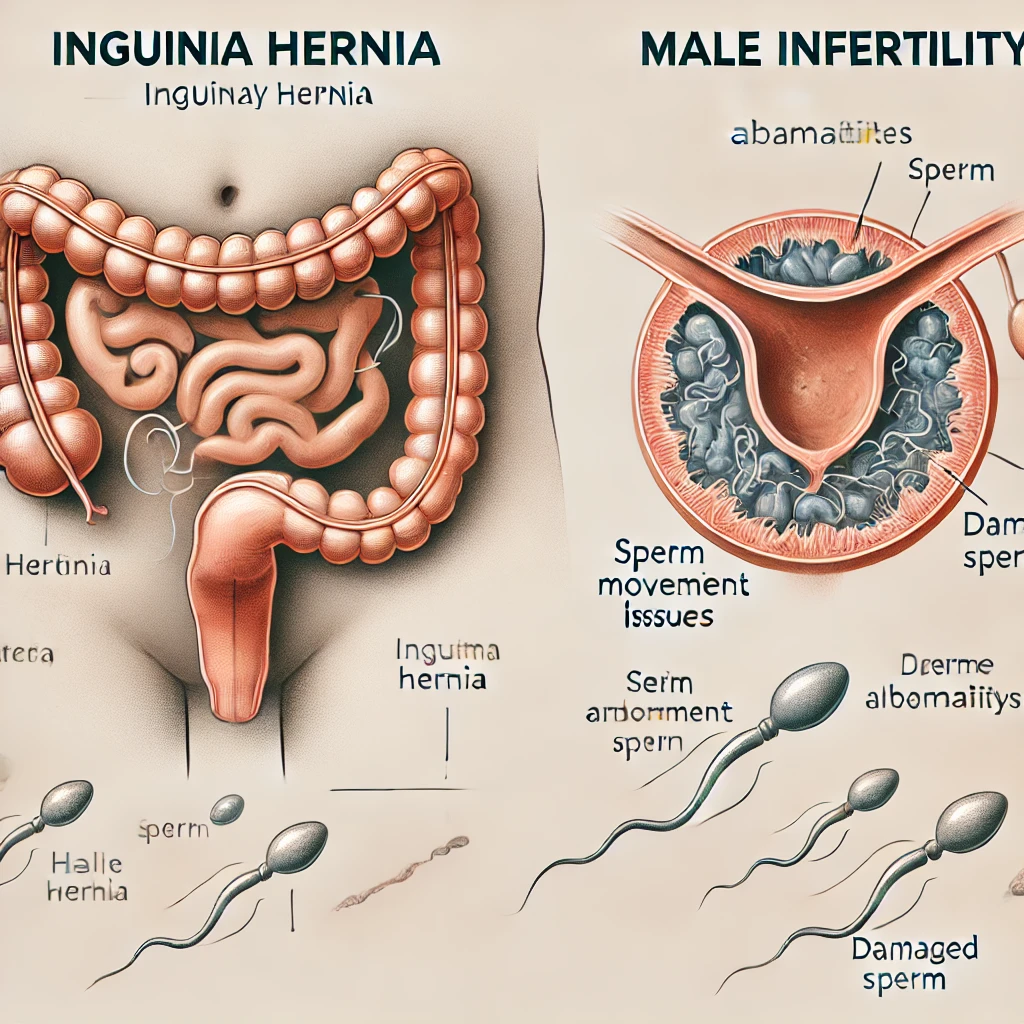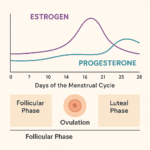
Table of Contents
Hernias and Male Fertility: Understanding the Connection
Hernia and male fertility can be a concerning topic for men. While hernias themselves don’t always directly affect fertility, the surgery to repair them can sometimes have an impact on male reproductive health.
Can Different Types of Hernia Affect Fertility Differently?
Generally, the most common type of hernia that might raise fertility concerns is an inguinal hernia. This occurs when a portion of the intestine pushes through a weak spot in the abdominal wall in the groin area.
- Why Inguinal Hernias? The proximity of the inguinal canal to the spermatic cord, which houses the vas deferens (the tube that carries sperm), makes it a potential area of concern.
- Other Hernia Types: While less common, other types like femoral hernias (occurring in the upper thigh) or umbilical hernias (around the belly button) are less likely to directly impact fertility.
How Does Inguinal Hernia Surgery Impact Sperm Production and Function?
Hernia repair surgery itself can sometimes have unintended consequences on male fertility.
- Nerve Damage: The nerves responsible for controlling testicular function are located in the vicinity of the inguinal canal. During surgery, there’s a slight risk of nerve damage, which could potentially affect sperm production (spermatogenesis) or sperm transport.
- Hormonal Changes: In rare cases, the surgical procedure might inadvertently affect hormone production, particularly testosterone, which is crucial for sperm production and male sexual function.
- Erectile Dysfunction: While less common, some men may experience erectile dysfunction following hernia surgery, which can indirectly impact fertility.
It’s important to note: These risks are typically low, and most men experience no significant fertility issues after hernia repair.
Specific Concerns for Men with Hernia
Can a hernia cause low sperm count or poor sperm quality?
While a hernia itself doesn’t directly cause low sperm count (oligospermia) or poor sperm quality (asthenozoospermia or teratozoospermia), it’s possible.
- Indirect Effects: If the hernia is large or causing significant discomfort, it might indirectly affect fertility. Chronic pain or discomfort can sometimes impact testosterone levels and overall well-being, which can influence sperm production.
Is erectile dysfunction a common complication of hernia or hernia surgery?
Erectile dysfunction (ED) is not a typical complication of hernia itself. However, as mentioned earlier, there’s a small risk of nerve damage during hernia surgery, which could potentially contribute to ED.
- Other Factors: It’s important to remember that other factors, such as age, lifestyle, and underlying health conditions, can also contribute to ED.
What are the long-term fertility risks after hernia repair?
The long-term fertility risks after hernia repair are generally low.
- Individual Variation: The impact on fertility can vary greatly from person to person.
- Open vs. Laparoscopic Surgery: Laparoscopic hernia repair, which involves smaller incisions and less tissue disruption, is generally considered to have a lower risk of complications affecting fertility compared to open surgery.
Diagnosis and Treatment :Hernias and Male Fertility
How is the impact of hernia on fertility assessed?
If you’re concerned about the potential impact of a hernia or hernia surgery on your fertility, it’s essential to discuss your concerns with your doctor.
- Comprehensive Evaluation: A comprehensive fertility evaluation may include:
- Semen analysis: To assess sperm count, motility, and morphology.
- Hormone testing: To check testosterone levels and other hormone levels.
- Physical examination: To assess for any underlying conditions that might affect fertility.
Are there specific fertility preservation options for men undergoing hernia surgery?
For men with concerns about fertility before undergoing hernia surgery, especially those undergoing treatment for cancer or other conditions that might affect fertility, fertility preservation options may be considered.
- Sperm Cryopreservation (Freezing): This involves collecting and freezing sperm samples for future use in assisted reproductive technologies (ART) such as in vitro fertilization (IVF).
What role does lifestyle play in fertility after hernia surgery?
Maintaining a healthy lifestyle can significantly improve overall fertility, including after hernia surgery.
- Healthy Diet: A balanced diet rich in fruits, vegetables, and whole grains can support sperm health.
- Regular Exercise: Regular physical activity can improve blood flow and overall health, which can benefit fertility.
- Weight Management: Maintaining a healthy weight can improve hormone levels and sperm quality.
- Limit Alcohol and Smoking: Excessive alcohol consumption and smoking can negatively impact sperm production and function.
Seeking Professional Help: Hernias and Male Fertility
When should a man with a hernia consult a urologist or fertility specialist?
It’s advisable to consult with a urologist or fertility specialist if:
- You have concerns about the potential impact of a hernia on your fertility.
- You experience any fertility issues after hernia surgery.
- You are considering fertility preservation options before hernia surgery.
What are the available treatment options for infertility related to hernia?
Treatment options for infertility related to hernia can vary depending on the underlying cause.
- Lifestyle Modifications: As mentioned earlier, lifestyle changes can significantly improve fertility.
- Medications: In some cases, medications may be prescribed to improve sperm production or address hormonal imbalances.
- Assisted Reproductive Technologies (ART): If lifestyle modifications and medications are not effective, ART options such as IVF may be considered.
Conclusion: Hernias and Male Fertility
While hernias themselves don’t always directly affect fertility, the surgery to repair them can sometimes have an impact on male reproductive health. Understanding their impact, seeking timely medical intervention, and exploring comprehensive treatment options are key to maintaining reproductive health.
FAQs: Hernias and Male Fertility
Can a hernia completely prevent pregnancy?
Not necessarily. While hernias can complicate fertility, many men successfully conceive with proper medical management.
How soon after hernia repair can we try to conceive?
Typically, waiting 3-6 months post-surgery allows full recovery and optimal reproductive function.
Are all hernias equally problematic for fertility?
No. Inguinal hernias near reproductive structures pose more significant risks compared to other hernia types.











Deference to author, some good information .